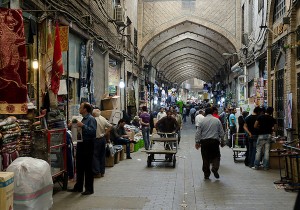More on the Falling Rial from Djavad Salehi-Isfahani
via Lobe Log
 Virginia Tech economist Djavad Salehi-Isfahani’s recent explanation of the rial situation in Iran generated a lot of attention, and much in the way of non-expert criticism, likely because it sways considerably from the prevailing narrative on Iran’s economy: it’s about to collapse. But Salehi-Isfahani is sticking to his guns. He elaborates on his reasoning and the effect of sanctions on his personal website:
Virginia Tech economist Djavad Salehi-Isfahani’s recent explanation of the rial situation in Iran generated a lot of attention, and much in the way of non-expert criticism, likely because it sways considerably from the prevailing narrative on Iran’s economy: it’s about to collapse. But Salehi-Isfahani is sticking to his guns. He elaborates on his reasoning and the effect of sanctions on his personal website:
Admittedly, the situation in Tehran is both confusing and shrouded in secrecy– for understandable reasons –and I do not claim to fully understand what is going on between oil exports, frozen and unfrozen Central Bank of Iran (CBI) accounts abroad, and rupees and yuans. But some reporters I talked to in the last few days did not know that Iran had a multiple exchange rate system, or that currency crises in oil exporting countries are different from those in which private sector earns the bulk of the foreign exchange. So, it seemed there was reason to say something.
With its diminished oil revenues the government can still shield large sections of the economy from the adverse impact of large devaluations in the the parallel market. The import classification system put into place last December was precisely for that. I do not know how much of the CBI forex goes to basic goods, how much to the Exchange Center, and how much, if any, to the parallel market. My guess is that, for obvious reasons, this market is not near the top of the list CBI priorities for cash infusion. I am not sure if any central bank faced with the same difficulties would use its foreign currency to calm a currency market gripped by fears stemming from tightening sanctions, even war. Any politician who decides otherwise would have to answer to voters (or people in the streets) when the country runs out of foreign exchange for essential imports.
In my view, given the sanctions and the emergency conditions that the country faces, the rise in the value of the rial in the parallel market is not at all surprising It should be no more a source of shock or surprise to see high ticket prices outside sports or entertainment events, especially when the quality of the event is uncertain beforehand. There are people who believe that scalpers should not be allowed to buy and sell concert tickets, and there are those who believe that such trades at the curb even at very high prices have their place. I happen to belong to the latter group. However, I fear that with the hoopla over the “rial’s collapse,” the government may run out of patience with the free market and send it underground. That would be unfortunate.
Some readers of my Lobelog post thought that it painted an overly optimistic picture of the situation. I had said that the currency crisis did not amount to economic collapse. It is also true that, as a matter of habit, I did not discuss conspiracy theories (which I rarely believe), such as those that would blame the government for creating this mess on purpose in order to make more rials, or those that blame a few ringleaders for corrupting the system. (But, as they say, just because you are paranoid it does not mean that they are not out to get you!)
Sanctions are not a game. They are designed to inflict pain on the people of the country they are imposed on, and as we have seen they are doing just that in Iran, and not all social strata feel the pain at the same rate. Iran’s government is in a position to decide who gets hurt more and who get off with less pain. For example, it has decided that keeping chicken production going is more important than paying the tuition of thousands of students abroad. That is a choice that many would disagree with, but to say that it makes sense from the point of view of Iran’s government is not to minimize the gravity of the situation or the level of pain on those who lose more than others. If the economy has not collapsed, economic growth has and with it the hopes of young people for finding a job and setting up new families.
En Español
The Latest
 From IPS News
From IPS News- Africa Pushing Limits To Boost Renewable Energy Supply Chain, Security
- Who Should be the Next UN Leader?PART 3
- Trade Deception Returns in Pan-Africanist Guise
- Solar Power and Biogas Empower Women Farmers in Brazil
- Migration in the Americas: A Dream That Can Turn Deadly
- Rural Entrepreneurs Thriving Against All Odds in Zimbabwe
- Conflict’s Long Shadow Has a Name: It’s Hunger
- Who Should be the Next UN Leader?PART 2
- Education Cannot Wait in Responding to the Regional Crisis Stemming From the Armed Conflict in Sudan
- Leaders Need to Break the Chokehold of Debt and Austerity. Our Health Depends on it
- Online fundraising for IPS Inter Press Service at Razoo













